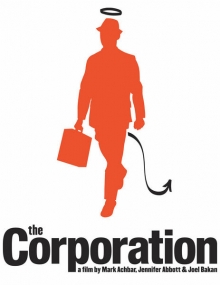The Corporation – shark, psychopath, or force for good?

Corporate Man
The Corporation – Mark Achbar, Jennifer Abbot
Question: should we regard a Corporation as an organisational shark or an organisational psychopath? It is the philosophical weakness, but documentary strength of The Corporation that it doesn’t tackle this central issue head on. It defines corporate behaviour as psychopathological at one point, but often throughout implies the shark metaphor. A lot hangs on the distinction. Moral attributes do not apply to the shark: it is a force of nature, its whole life devoted to eating simply to survive. It just acts out its nature: it is not ‘evil’, ‘wicked’, or ‘cruel’ it just is what it is. The shark doesn’t make a rational choice. It is amoral, not immoral.
However, the passionate criticism of Corporate behaviour found in the film clearly indicates an assumption of reason, choice, and therefore morally reprehensible behaviour. The dominance of this view is re-inforced by the implied approbation for one of the CEO’s in the film, Ray Anderson of Interface Carpets, whose ecological epiphany has led him to set environmental sustainability as his key corporate objective. In contrast Milton Friedman says that morality is outside the parameters of the Corporation, its responsibilities are exclusively to its market and its shareholders. Morality should be left to the politicians (Lord help us!)
So: can we shame, challenge, persuade Corporations to change their immoral and anti-social ways to become good, constructive members of the community: or do we accept that their task is simply to hunt constantly and exclusively for profit in order to survive and through their success contribute to society through the generation of economic wealth, jobs, and the payment of tax? Opinion is divided: Naomi Klein ‘No Logo’ and Sir Mark Moody Stewart (ex-CEO of Shell) seem to think yes – while the ever pungent Michael Moore is more on the shark line with the view that the irreducible driving force of Corporations is an irresistibly voracious search for profit – at any cost.
This is a film of real substance, defined by its content not form. Cinematically there is not much to say: about 40 highly articulate talking heads whose views are illustrated by news footage. Effective, well edited, but simple. Based on a book, the film adopts a very simple ‘headed chapter’ structure. A movie of profoundly important and seriously challenging ideas, this is essential viewing for anyone interested in the influence on our lives and politics of our corporate, marketing culture.
Even in this elevated company Moore is very good. Pointing out that the dominance of capitalism expressed though Corporate behaviour renders all human relationships transactional and financial. Our sense of humanity and community is overwhelmed by the advertising and media driven assault on our acquisitive, materialistic instincts.
The sense of a culture in decline under the influence of capitalist driven media, is well argued and convincingly evidenced: the refusal of Fox News to broadcast their own investigative reporters’ Jane Akre and Steve Wilson’s whistle-blowing programme on the activities of Monsanto in hiding damage to public health through one of their products and their incredulity that the courts decided that intentional distortion of the news was not illegal. The realisation that IBM sold their pre-computer punch-card system to Germany in 1939 and made money from its use to meticulously record and administer the death camps. And more recently the successful efforts of US Corporations to patent the human genome: the commoditisation of life itself. The appalling Lucy Hughes, VP of Initiative Media Corp proud of the effectiveness of her media campaign, targetting children, to create the ‘nag factor’ whereby kids were induced to nag parents into unwanted purchases. It is pointed out that this amounts to an assault on the unformed developmental vulnerabilities of children.
Michael Moore sums up the irony and the paradox of the film when he points out that he makes trenchantly anti-corporate movies, funded and distributed by the very corporations he is attacking. The reason is as utterly consistent as it is absurd; they fund even attacks on themselves because they know they can make money from it. It is however, a little strange that there is no mention of Enron or Moore’s corporate bete noir Halliburton, currently profiting mightily from the Iraq war.
This is a serious, intellectually challenging film of substance: well worth picking up on DVD.
(November 2004)
Filed under: 4 stars, achbar/abbot/bakan, Documentary, M Achbar/J Bennet, Philosophical, Political

